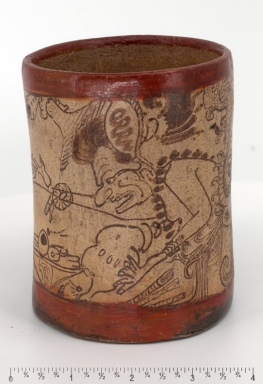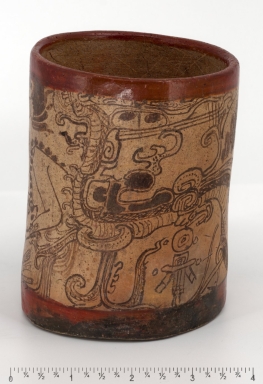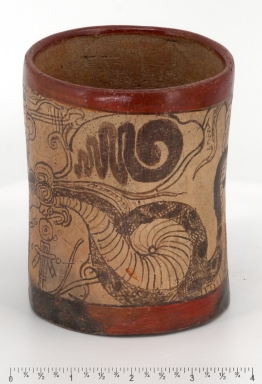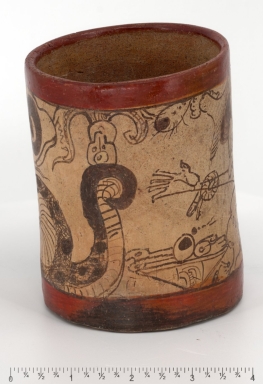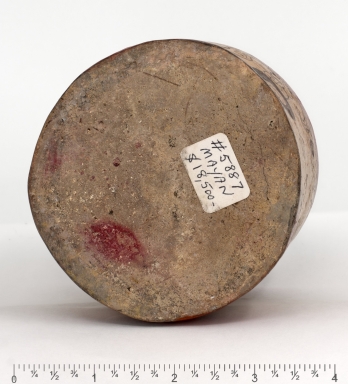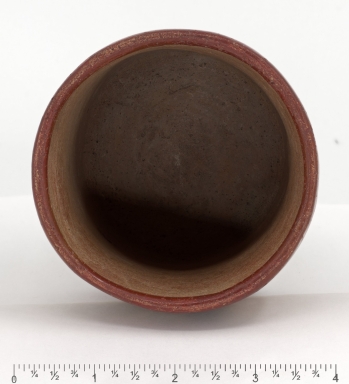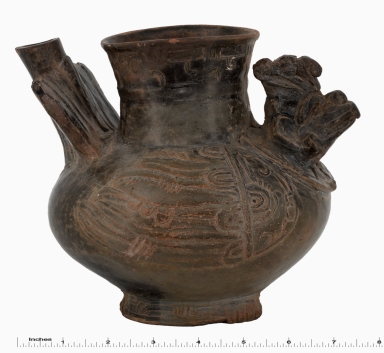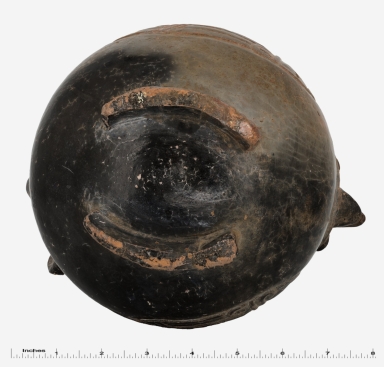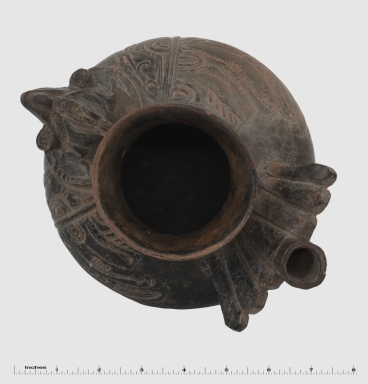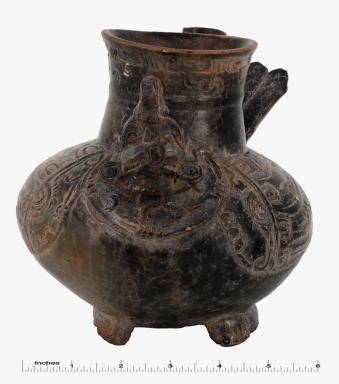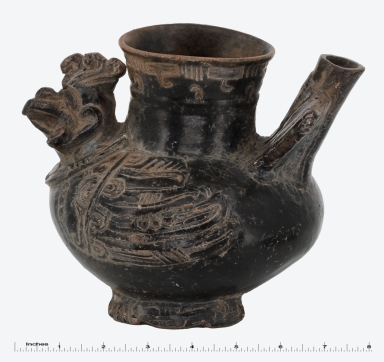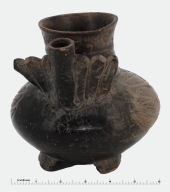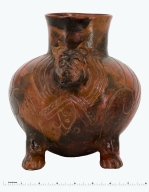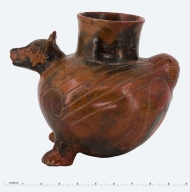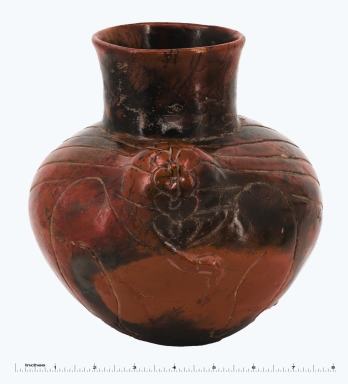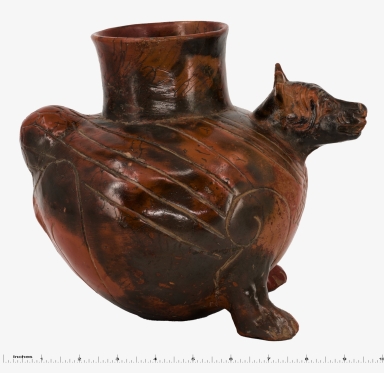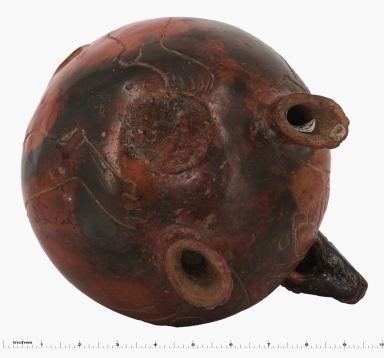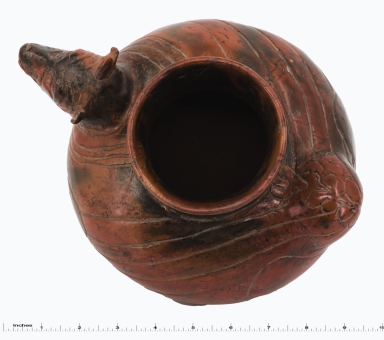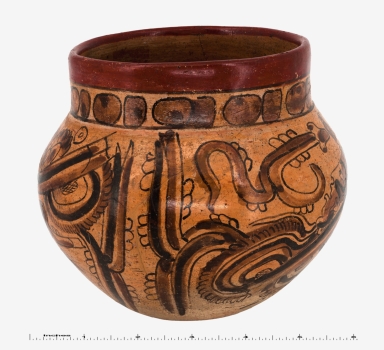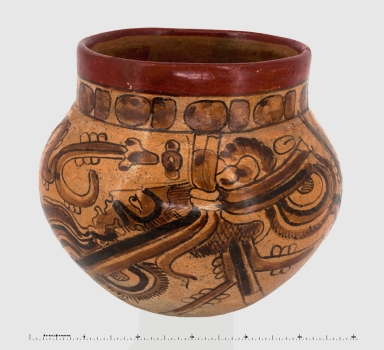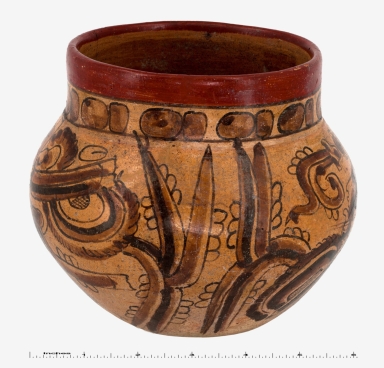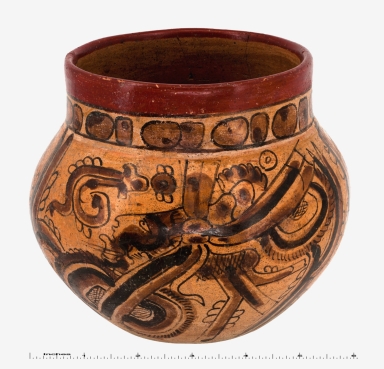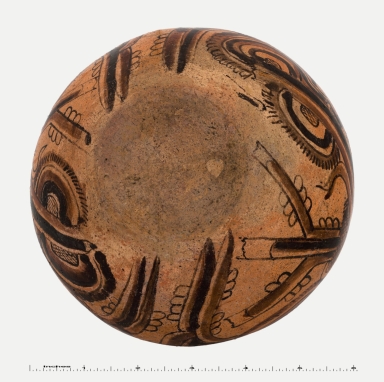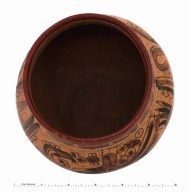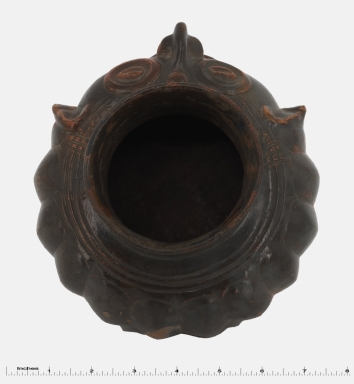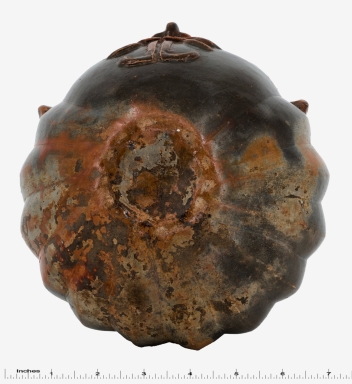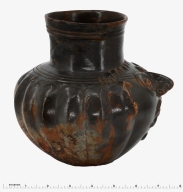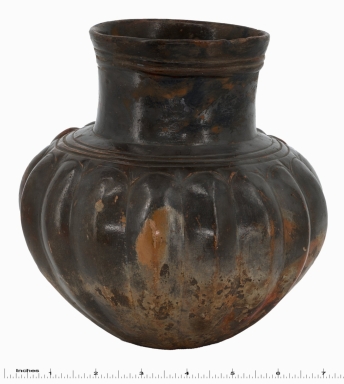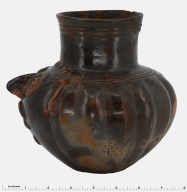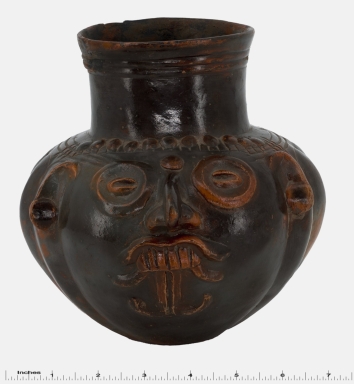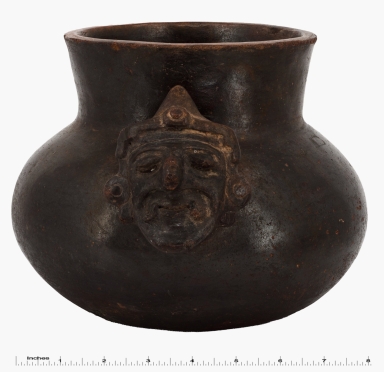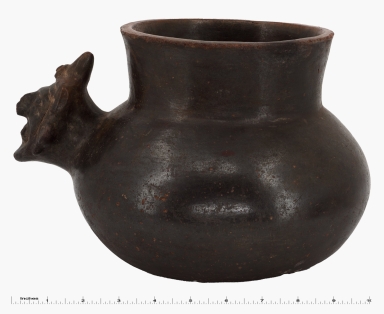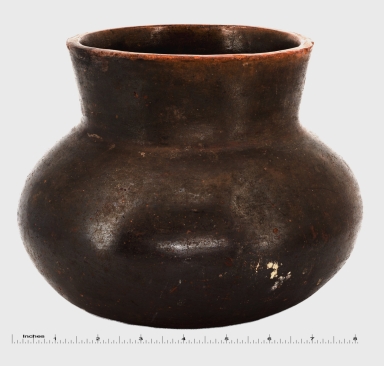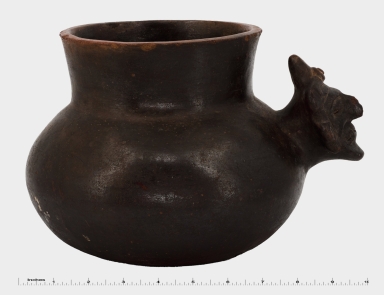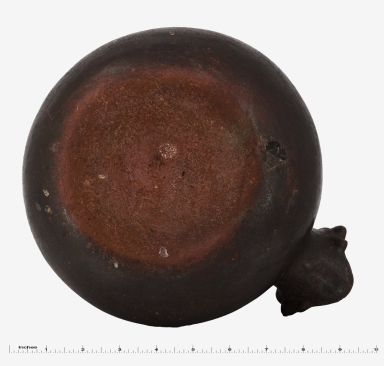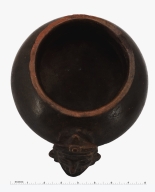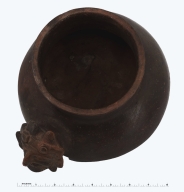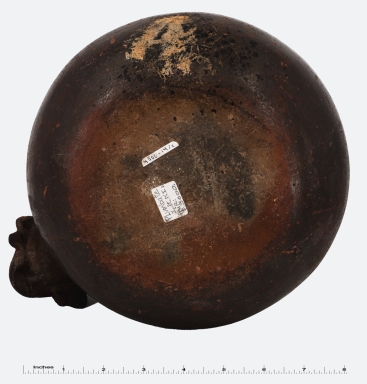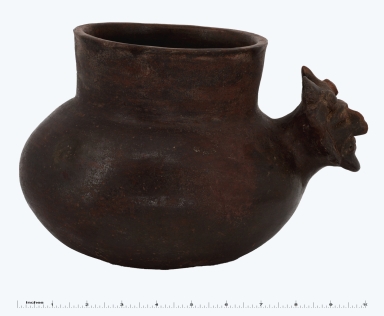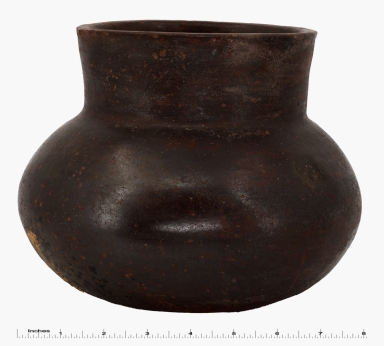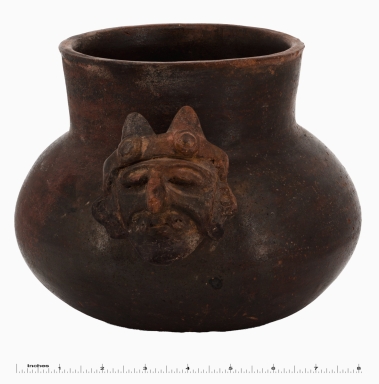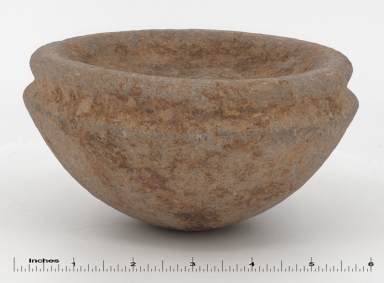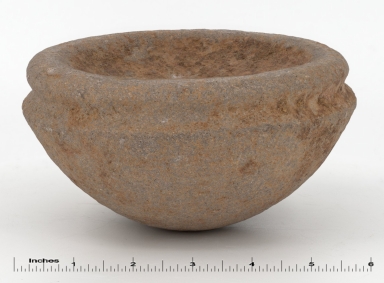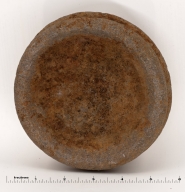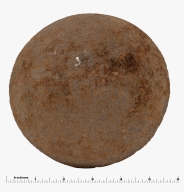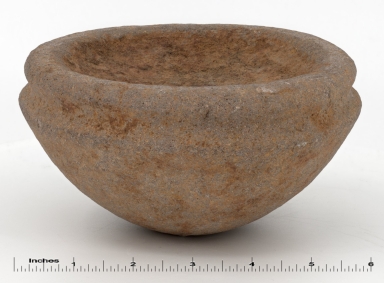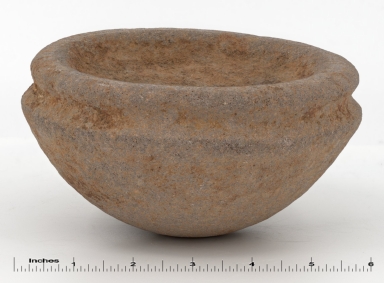Who What Where WhenREMOVEWHAT
|
REFINE
Browse All : Pottery--Guatemala
1-48 of 48
Title
Codex style vessel : old God emerges from the mouth of a serpent.
Description
This codex style vessel represents a scene for the underworld, Xilbaba. An aged Maya god emerges from the mouth of the bearded dragon, Ochu Chan. Behind the old God appears the profile image of the Jeslure (sic) God, a god important to Maya nobility. In front of the old god is an offering vessel with human bones, an eyeball, and a severed hand.
Subject
[Pottery--Guatemala, Drinking vessels--Guatemala, Ceramic tableware--Guatemala, Maya art--Guatemala, Mayas--Antiquities, Indigenous peoples--Antiquities]
Date
between 550 and 850
Title
Codex style vessel : old God emerges from the mouth of a serpent.
Description
This codex style vessel represents a scene for the underworld, Xilbaba. An aged Maya god emerges from the mouth of the bearded dragon, Ochu Chan. Behind the old God appears the profile image of the Jeslure (sic) God, a god important to Maya nobility. In front of the old god is an offering vessel with human bones, an eyeball, and a severed hand.
Subject
[Pottery--Guatemala, Drinking vessels--Guatemala, Ceramic tableware--Guatemala, Maya art--Guatemala, Mayas--Antiquities, Indigenous peoples--Antiquities]
Date
between 550 and 850
Title
Codex style vessel : old God emerges from the mouth of a serpent.
Description
This codex style vessel represents a scene for the underworld, Xilbaba. An aged Maya god emerges from the mouth of the bearded dragon, Ochu Chan. Behind the old God appears the profile image of the Jeslure (sic) God, a god important to Maya nobility. In front of the old god is an offering vessel with human bones, an eyeball, and a severed hand.
Subject
[Pottery--Guatemala, Drinking vessels--Guatemala, Ceramic tableware--Guatemala, Maya art--Guatemala, Mayas--Antiquities, Indigenous peoples--Antiquities]
Date
between 550 and 850
Title
Codex style vessel : old God emerges from the mouth of a serpent.
Description
This codex style vessel represents a scene for the underworld, Xilbaba. An aged Maya god emerges from the mouth of the bearded dragon, Ochu Chan. Behind the old God appears the profile image of the Jeslure (sic) God, a god important to Maya nobility. In front of the old god is an offering vessel with human bones, an eyeball, and a severed hand.
Subject
[Pottery--Guatemala, Drinking vessels--Guatemala, Ceramic tableware--Guatemala, Maya art--Guatemala, Mayas--Antiquities, Indigenous peoples--Antiquities]
Date
between 550 and 850
Title
Codex style vessel : old God emerges from the mouth of a serpent.
Description
This codex style vessel represents a scene for the underworld, Xilbaba. An aged Maya god emerges from the mouth of the bearded dragon, Ochu Chan. Behind the old God appears the profile image of the Jeslure (sic) God, a god important to Maya nobility. In front of the old god is an offering vessel with human bones, an eyeball, and a severed hand.
Subject
[Pottery--Guatemala, Drinking vessels--Guatemala, Ceramic tableware--Guatemala, Maya art--Guatemala, Mayas--Antiquities, Indigenous peoples--Antiquities]
Date
between 550 and 850
Title
Codex style vessel : old God emerges from the mouth of a serpent.
Description
This codex style vessel represents a scene for the underworld, Xilbaba. An aged Maya god emerges from the mouth of the bearded dragon, Ochu Chan. Behind the old God appears the profile image of the Jeslure (sic) God, a god important to Maya nobility. In front of the old god is an offering vessel with human bones, an eyeball, and a severed hand.
Subject
[Pottery--Guatemala, Drinking vessels--Guatemala, Ceramic tableware--Guatemala, Maya art--Guatemala, Mayas--Antiquities, Indigenous peoples--Antiquities]
Date
between 550 and 850
Title
Turkey vessel with double spout : rattle in the head.
Description
Plumbate vessels are the only vitrified (glazed) pottery found in ancient America. They were made with pottery molds and mass-produced. Mesoamericans domesticated the turkey for their meat and feathers. The animal is considered sacred and is sacrificed for specific ceremonies.
Subject
[Pottery--Guatemala, Ceramic tableware--Guatemala, Drinking vessels--Guatemala, Art--Guatemala, Indigenous peoples--Antiquities]
Date
between 900 and 1100
Title
Turkey vessel with double spout : rattle in the head.
Description
Plumbate vessels are the only vitrified (glazed) pottery found in ancient America. They were made with pottery molds and mass-produced. Mesoamericans domesticated the turkey for their meat and feathers. The animal is considered sacred and is sacrificed for specific ceremonies.
Subject
[Pottery--Guatemala, Ceramic tableware--Guatemala, Drinking vessels--Guatemala, Art--Guatemala, Indigenous peoples--Antiquities]
Date
between 900 and 1100
Title
Turkey vessel with double spout : rattle in the head.
Description
Plumbate vessels are the only vitrified (glazed) pottery found in ancient America. They were made with pottery molds and mass-produced. Mesoamericans domesticated the turkey for their meat and feathers. The animal is considered sacred and is sacrificed for specific ceremonies.
Subject
[Pottery--Guatemala, Ceramic tableware--Guatemala, Drinking vessels--Guatemala, Art--Guatemala, Indigenous peoples--Antiquities]
Date
between 900 and 1100
Title
Turkey vessel with double spout : rattle in the head.
Description
Plumbate vessels are the only vitrified (glazed) pottery found in ancient America. They were made with pottery molds and mass-produced. Mesoamericans domesticated the turkey for their meat and feathers. The animal is considered sacred and is sacrificed for specific ceremonies.
Subject
[Pottery--Guatemala, Ceramic tableware--Guatemala, Drinking vessels--Guatemala, Art--Guatemala, Indigenous peoples--Antiquities]
Date
between 900 and 1100
Title
Turkey vessel with double spout : rattle in the head.
Description
Plumbate vessels are the only vitrified (glazed) pottery found in ancient America. They were made with pottery molds and mass-produced. Mesoamericans domesticated the turkey for their meat and feathers. The animal is considered sacred and is sacrificed for specific ceremonies.
Subject
[Pottery--Guatemala, Ceramic tableware--Guatemala, Drinking vessels--Guatemala, Art--Guatemala, Indigenous peoples--Antiquities]
Date
between 900 and 1100
Title
Turkey vessel with double spout : rattle in the head.
Description
Plumbate vessels are the only vitrified (glazed) pottery found in ancient America. They were made with pottery molds and mass-produced. Mesoamericans domesticated the turkey for their meat and feathers. The animal is considered sacred and is sacrificed for specific ceremonies.
Subject
[Pottery--Guatemala, Ceramic tableware--Guatemala, Drinking vessels--Guatemala, Art--Guatemala, Indigenous peoples--Antiquities]
Date
between 900 and 1100
Title
Vessel in the form of a dog, Esquintla.
Description
The Maya domesticated their dogs for household pets and hunting animals. They were raised for food, a heat source (hot water bottle) and sacrificial animal. The god Quetzalcoatl or Feathered Serpent's twin brother was called Xolotl. He was believed to help guide souls through Xibalba or the underworld. The esquintla wears an Aztec heart amulet around his neck.
Subject
[Pottery--Guatemala, Ceramic tableware--Guatemala, Drinking vessels--Guatemala, Maya art--Guatemala, Mayas--Antiquities, Indigenous peoples--Antiquities]
Date
between 900 and 1100
Title
Vessel in the form of a dog, Esquintla.
Description
The Maya domesticated their dogs for household pets and hunting animals. They were raised for food, a heat source (hot water bottle) and sacrificial animal. The god Quetzalcoatl or Feathered Serpent's twin brother was called Xolotl. He was believed to help guide souls through Xibalba or the underworld. The esquintla wears an Aztec heart amulet around his neck.
Subject
[Pottery--Guatemala, Ceramic tableware--Guatemala, Drinking vessels--Guatemala, Maya art--Guatemala, Mayas--Antiquities, Indigenous peoples--Antiquities]
Date
between 900 and 1100
Title
Vessel in the form of a dog, Esquintla.
Description
The Maya domesticated their dogs for household pets and hunting animals. They were raised for food, a heat source (hot water bottle) and sacrificial animal. The god Quetzalcoatl or Feathered Serpent's twin brother was called Xolotl. He was believed to help guide souls through Xibalba or the underworld. The esquintla wears an Aztec heart amulet around his neck.
Subject
[Pottery--Guatemala, Ceramic tableware--Guatemala, Drinking vessels--Guatemala, Maya art--Guatemala, Mayas--Antiquities, Indigenous peoples--Antiquities]
Date
between 900 and 1100
Title
Vessel in the form of a dog, Esquintla.
Description
The Maya domesticated their dogs for household pets and hunting animals. They were raised for food, a heat source (hot water bottle) and sacrificial animal. The god Quetzalcoatl or Feathered Serpent's twin brother was called Xolotl. He was believed to help guide souls through Xibalba or the underworld. The esquintla wears an Aztec heart amulet around his neck.
Subject
[Pottery--Guatemala, Ceramic tableware--Guatemala, Drinking vessels--Guatemala, Maya art--Guatemala, Mayas--Antiquities, Indigenous peoples--Antiquities]
Date
between 900 and 1100
Title
Vessel in the form of a dog, Esquintla.
Description
The Maya domesticated their dogs for household pets and hunting animals. They were raised for food, a heat source (hot water bottle) and sacrificial animal. The god Quetzalcoatl or Feathered Serpent's twin brother was called Xolotl. He was believed to help guide souls through Xibalba or the underworld. The esquintla wears an Aztec heart amulet around his neck.
Subject
[Pottery--Guatemala, Ceramic tableware--Guatemala, Drinking vessels--Guatemala, Maya art--Guatemala, Mayas--Antiquities, Indigenous peoples--Antiquities]
Date
between 900 and 1100
Title
Vessel in the form of a dog, Esquintla.
Description
The Maya domesticated their dogs for household pets and hunting animals. They were raised for food, a heat source (hot water bottle) and sacrificial animal. The god Quetzalcoatl or Feathered Serpent's twin brother was called Xolotl. He was believed to help guide souls through Xibalba or the underworld. The esquintla wears an Aztec heart amulet around his neck.
Subject
[Pottery--Guatemala, Ceramic tableware--Guatemala, Drinking vessels--Guatemala, Maya art--Guatemala, Mayas--Antiquities, Indigenous peoples--Antiquities]
Date
between 900 and 1100
Title
Painted bowl or cup : codex style.
Description
The Maya elite enjoyed drinking cool frothy chocolate water laced with chile or vanilla. The mirror image on this chocolate vessel represents the severed head of the young corn god of the Maya Hero Twins, Hunahpu and Xbalanque. The pseudo-glyphs around the neck of the pot are decorative.
Subject
[Ceramic bowls--Guatemala, Pottery--Guatemala, Ceramic tableware--Guatemala, Mayas--Antiquities, Maya art--Guatemala, Indigenous peoples--Antiquities]
Date
between 300 and 900
Title
Painted bowl or cup : codex style.
Description
The Maya elite enjoyed drinking cool frothy chocolate water laced with chile or vanilla. The mirror image on this chocolate vessel represents the severed head of the young corn god of the Maya Hero Twins, Hunahpu and Xbalanque. The pseudo-glyphs around the neck of the pot are decorative.
Subject
[Ceramic bowls--Guatemala, Pottery--Guatemala, Ceramic tableware--Guatemala, Mayas--Antiquities, Maya art--Guatemala, Indigenous peoples--Antiquities]
Date
between 300 and 900
Title
Painted bowl or cup : codex style.
Description
The Maya elite enjoyed drinking cool frothy chocolate water laced with chile or vanilla. The mirror image on this chocolate vessel represents the severed head of the young corn god of the Maya Hero Twins, Hunahpu and Xbalanque. The pseudo-glyphs around the neck of the pot are decorative.
Subject
[Ceramic bowls--Guatemala, Pottery--Guatemala, Ceramic tableware--Guatemala, Mayas--Antiquities, Maya art--Guatemala, Indigenous peoples--Antiquities]
Date
between 300 and 900
Title
Painted bowl or cup : codex style.
Description
The Maya elite enjoyed drinking cool frothy chocolate water laced with chile or vanilla. The mirror image on this chocolate vessel represents the severed head of the young corn god of the Maya Hero Twins, Hunahpu and Xbalanque. The pseudo-glyphs around the neck of the pot are decorative.
Subject
[Ceramic bowls--Guatemala, Pottery--Guatemala, Ceramic tableware--Guatemala, Mayas--Antiquities, Maya art--Guatemala, Indigenous peoples--Antiquities]
Date
between 300 and 900
Title
Painted bowl or cup : codex style.
Description
The Maya elite enjoyed drinking cool frothy chocolate water laced with chile or vanilla. The mirror image on this chocolate vessel represents the severed head of the young corn god of the Maya Hero Twins, Hunahpu and Xbalanque. The pseudo-glyphs around the neck of the pot are decorative.
Subject
[Ceramic bowls--Guatemala, Pottery--Guatemala, Ceramic tableware--Guatemala, Mayas--Antiquities, Maya art--Guatemala, Indigenous peoples--Antiquities]
Date
between 300 and 900
Title
Painted bowl or cup : codex style.
Description
The Maya elite enjoyed drinking cool frothy chocolate water laced with chile or vanilla. The mirror image on this chocolate vessel represents the severed head of the young corn god of the Maya Hero Twins, Hunahpu and Xbalanque. The pseudo-glyphs around the neck of the pot are decorative.
Subject
[Ceramic bowls--Guatemala, Pottery--Guatemala, Ceramic tableware--Guatemala, Mayas--Antiquities, Maya art--Guatemala, Indigenous peoples--Antiquities]
Date
between 300 and 900
Title
Maya plumbate choc vessel.
Description
The elite of Mesoamerica were always looking for new and better elite vessels to serve their guests cacao. A new type of ceramic, plumbate ware, appealed to their sensabilities for its varigated, shiny, metallic surface. This phytomorhpic cacao vessel depicts the maya rain god Chac.
Subject
[Drinking vessels--Guatemala, Pottery--Guatemala, Ceramic sculpture--Guatemala, Mayas--Antiquities, Indigenous peoples--Antiquities]
Date
between 900 and 1250
Title
Maya plumbate choc vessel.
Description
The elite of Mesoamerica were always looking for new and better elite vessels to serve their guests cacao. A new type of ceramic, plumbate ware, appealed to their sensabilities for its varigated, shiny, metallic surface. This phytomorhpic cacao vessel depicts the maya rain god Chac.
Subject
[Drinking vessels--Guatemala, Pottery--Guatemala, Ceramic sculpture--Guatemala, Mayas--Antiquities, Indigenous peoples--Antiquities]
Date
between 900 and 1250
Title
Maya plumbate choc vessel.
Description
The elite of Mesoamerica were always looking for new and better elite vessels to serve their guests cacao. A new type of ceramic, plumbate ware, appealed to their sensabilities for its varigated, shiny, metallic surface. This phytomorhpic cacao vessel depicts the maya rain god Chac.
Subject
[Drinking vessels--Guatemala, Pottery--Guatemala, Ceramic sculpture--Guatemala, Mayas--Antiquities, Indigenous peoples--Antiquities]
Date
between 900 and 1250
Title
Maya plumbate choc vessel.
Description
The elite of Mesoamerica were always looking for new and better elite vessels to serve their guests cacao. A new type of ceramic, plumbate ware, appealed to their sensabilities for its varigated, shiny, metallic surface. This phytomorhpic cacao vessel depicts the maya rain god Chac.
Subject
[Drinking vessels--Guatemala, Pottery--Guatemala, Ceramic sculpture--Guatemala, Mayas--Antiquities, Indigenous peoples--Antiquities]
Date
between 900 and 1250
Title
Maya plumbate choc vessel.
Description
The elite of Mesoamerica were always looking for new and better elite vessels to serve their guests cacao. A new type of ceramic, plumbate ware, appealed to their sensabilities for its varigated, shiny, metallic surface. This phytomorhpic cacao vessel depicts the maya rain god Chac.
Subject
[Drinking vessels--Guatemala, Pottery--Guatemala, Ceramic sculpture--Guatemala, Mayas--Antiquities, Indigenous peoples--Antiquities]
Date
between 900 and 1250
Title
Maya plumbate choc vessel.
Description
The elite of Mesoamerica were always looking for new and better elite vessels to serve their guests cacao. A new type of ceramic, plumbate ware, appealed to their sensabilities for its varigated, shiny, metallic surface. This phytomorhpic cacao vessel depicts the maya rain god Chac.
Subject
[Drinking vessels--Guatemala, Pottery--Guatemala, Ceramic sculpture--Guatemala, Mayas--Antiquities, Indigenous peoples--Antiquities]
Date
between 900 and 1250
Title
A pair of Maya plumbate vessels : deity Head : A.
Description
Two similar plumbate ollas were formed from a bulb bottom, a flaring high neck collar rim, and fanged deity applique. the fang deities represent concepts of one or uniqueness and duality or opposition.
Subject
[Drinking vessels--Guatemala, Pottery--Guatemala, Ceramic tableware--Guatemala, Maya art--Guatemala, Indigenous peoples--Antiquities]
Date
between 500 and 800
Title
A pair of Maya plumbate vessels : deity Head : A.
Description
Two similar plumbate ollas were formed from a bulb bottom, a flaring high neck collar rim, and fanged deity applique. the fang deities represent concepts of one or uniqueness and duality or opposition.
Subject
[Drinking vessels--Guatemala, Pottery--Guatemala, Ceramic tableware--Guatemala, Maya art--Guatemala, Indigenous peoples--Antiquities]
Date
between 500 and 800
Title
A pair of Maya plumbate vessels : deity Head : A.
Description
Two similar plumbate ollas were formed from a bulb bottom, a flaring high neck collar rim, and fanged deity applique. the fang deities represent concepts of one or uniqueness and duality or opposition.
Subject
[Drinking vessels--Guatemala, Pottery--Guatemala, Ceramic tableware--Guatemala, Maya art--Guatemala, Indigenous peoples--Antiquities]
Date
between 500 and 800
Title
A pair of Maya plumbate vessels : deity Head : A.
Description
Two similar plumbate ollas were formed from a bulb bottom, a flaring high neck collar rim, and fanged deity applique. the fang deities represent concepts of one or uniqueness and duality or opposition.
Subject
[Drinking vessels--Guatemala, Pottery--Guatemala, Ceramic tableware--Guatemala, Maya art--Guatemala, Indigenous peoples--Antiquities]
Date
between 500 and 800
Title
A pair of Maya plumbate vessels : deity Head : A.
Description
Two similar plumbate ollas were formed from a bulb bottom, a flaring high neck collar rim, and fanged deity applique. the fang deities represent concepts of one or uniqueness and duality or opposition.
Subject
[Drinking vessels--Guatemala, Pottery--Guatemala, Ceramic tableware--Guatemala, Maya art--Guatemala, Indigenous peoples--Antiquities]
Date
between 500 and 800
Title
A pair of Maya plumbate vessels : deity Head : A.
Description
Two similar plumbate ollas were formed from a bulb bottom, a flaring high neck collar rim, and fanged deity applique. the fang deities represent concepts of one or uniqueness and duality or opposition.
Subject
[Drinking vessels--Guatemala, Pottery--Guatemala, Ceramic tableware--Guatemala, Maya art--Guatemala, Indigenous peoples--Antiquities]
Date
between 500 and 800
Title
A pair of Maya plumbate vessels : deity Head : B.
Description
Two similar plumbate ollas were formed from a bulb bottom, a flaring high neck collar rim, and fanged deity applique. The fang deities represent concepts of one or uniqueness and duality or opposition.
Subject
[Drinking vessels--Guatemala, Pottery--Guatemala, Ceramic tableware--Guatemala, Maya art--Guatemala, Mayas--Antiquities, Indigenous peoples--Antiquities]
Date
between 500 and 800
Title
A pair of Maya plumbate vessels : deity Head : B.
Description
Two similar plumbate ollas were formed from a bulb bottom, a flaring high neck collar rim, and fanged deity applique. The fang deities represent concepts of one or uniqueness and duality or opposition.
Subject
[Drinking vessels--Guatemala, Pottery--Guatemala, Ceramic tableware--Guatemala, Maya art--Guatemala, Mayas--Antiquities, Indigenous peoples--Antiquities]
Date
between 500 and 800
Title
A pair of Maya plumbate vessels : deity Head : B.
Description
Two similar plumbate ollas were formed from a bulb bottom, a flaring high neck collar rim, and fanged deity applique. The fang deities represent concepts of one or uniqueness and duality or opposition.
Subject
[Drinking vessels--Guatemala, Pottery--Guatemala, Ceramic tableware--Guatemala, Maya art--Guatemala, Mayas--Antiquities, Indigenous peoples--Antiquities]
Date
between 500 and 800
Title
A pair of Maya plumbate vessels : deity Head : B.
Description
Two similar plumbate ollas were formed from a bulb bottom, a flaring high neck collar rim, and fanged deity applique. The fang deities represent concepts of one or uniqueness and duality or opposition.
Subject
[Drinking vessels--Guatemala, Pottery--Guatemala, Ceramic tableware--Guatemala, Maya art--Guatemala, Mayas--Antiquities, Indigenous peoples--Antiquities]
Date
between 500 and 800
Title
A pair of Maya plumbate vessels : deity Head : B.
Description
Two similar plumbate ollas were formed from a bulb bottom, a flaring high neck collar rim, and fanged deity applique. The fang deities represent concepts of one or uniqueness and duality or opposition.
Subject
[Drinking vessels--Guatemala, Pottery--Guatemala, Ceramic tableware--Guatemala, Maya art--Guatemala, Mayas--Antiquities, Indigenous peoples--Antiquities]
Date
between 500 and 800
Title
A pair of Maya plumbate vessels : deity Head : B.
Description
Two similar plumbate ollas were formed from a bulb bottom, a flaring high neck collar rim, and fanged deity applique. The fang deities represent concepts of one or uniqueness and duality or opposition.
Subject
[Drinking vessels--Guatemala, Pottery--Guatemala, Ceramic tableware--Guatemala, Maya art--Guatemala, Mayas--Antiquities, Indigenous peoples--Antiquities]
Date
between 500 and 800
Title
Mushroom cup : metate or molcajete.
Description
Small molcajetes are used to grind minerals, earth for colors or plants for medicine and drugs. The shape of this molcajete suggests the cap of a mushroom. Special mushrooms are used to enter hallucinogenic trances by a shaman to access different realities.
Subject
[Stone carving--Guatemala, Pottery--Guatemala, Maya sculpture--Guatemala, Mayas--Antiquities, Indigenous peoples--Antiquities]
Date
ca. 500 BC
Title
Mushroom cup : metate or molcajete.
Description
Small molcajetes are used to grind minerals, earth for colors or plants for medicine and drugs. The shape of this molcajete suggests the cap of a mushroom. Special mushrooms are used to enter hallucinogenic trances by a shaman to access different realities.
Subject
[Stone carving--Guatemala, Pottery--Guatemala, Maya sculpture--Guatemala, Mayas--Antiquities, Indigenous peoples--Antiquities]
Date
ca. 500 BC
Title
Mushroom cup : metate or molcajete.
Description
Small molcajetes are used to grind minerals, earth for colors or plants for medicine and drugs. The shape of this molcajete suggests the cap of a mushroom. Special mushrooms are used to enter hallucinogenic trances by a shaman to access different realities.
Subject
[Stone carving--Guatemala, Pottery--Guatemala, Maya sculpture--Guatemala, Mayas--Antiquities, Indigenous peoples--Antiquities]
Date
ca. 500 BC
Title
Mushroom cup : metate or molcajete.
Description
Small molcajetes are used to grind minerals, earth for colors or plants for medicine and drugs. The shape of this molcajete suggests the cap of a mushroom. Special mushrooms are used to enter hallucinogenic trances by a shaman to access different realities.
Subject
[Stone carving--Guatemala, Pottery--Guatemala, Maya sculpture--Guatemala, Mayas--Antiquities, Indigenous peoples--Antiquities]
Date
ca. 500 BC
Title
Mushroom cup : metate or molcajete.
Description
Small molcajetes are used to grind minerals, earth for colors or plants for medicine and drugs. The shape of this molcajete suggests the cap of a mushroom. Special mushrooms are used to enter hallucinogenic trances by a shaman to access different realities.
Subject
[Stone carving--Guatemala, Pottery--Guatemala, Maya sculpture--Guatemala, Mayas--Antiquities, Indigenous peoples--Antiquities]
Date
ca. 500 BC
Title
Mushroom cup : metate or molcajete.
Description
Small molcajetes are used to grind minerals, earth for colors or plants for medicine and drugs. The shape of this molcajete suggests the cap of a mushroom. Special mushrooms are used to enter hallucinogenic trances by a shaman to access different realities.
Subject
[Stone carving--Guatemala, Pottery--Guatemala, Maya sculpture--Guatemala, Mayas--Antiquities, Indigenous peoples--Antiquities]
Date
ca. 500 BC
1-48 of 48
|
